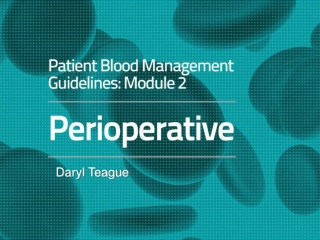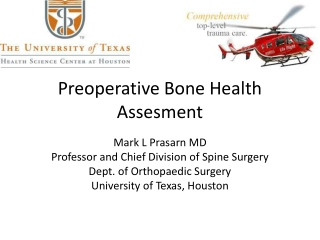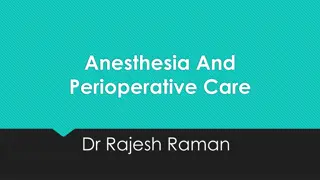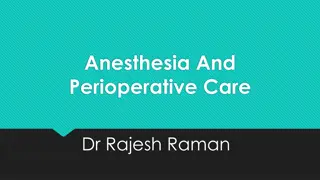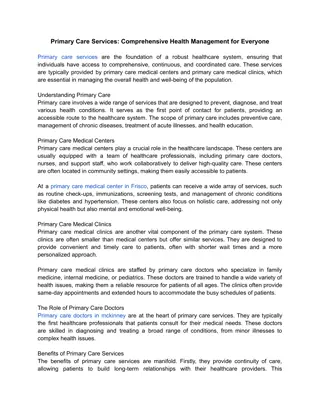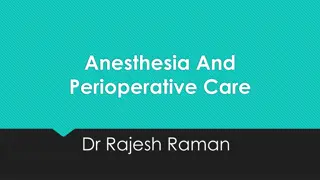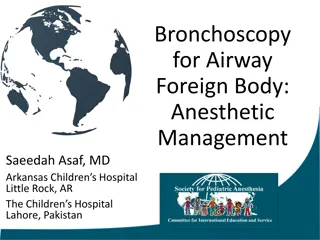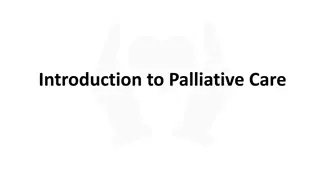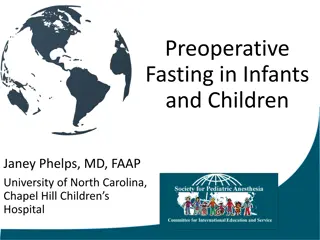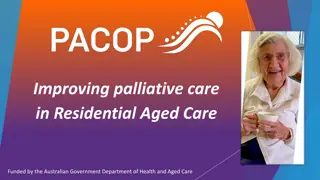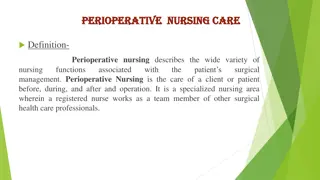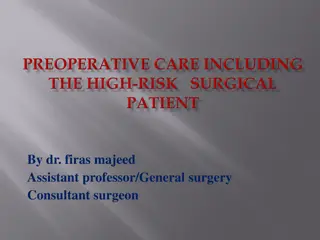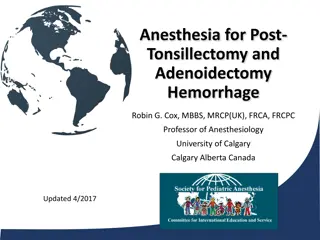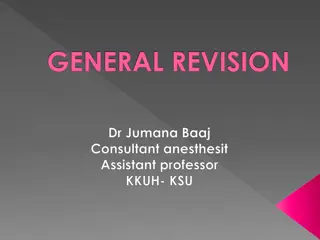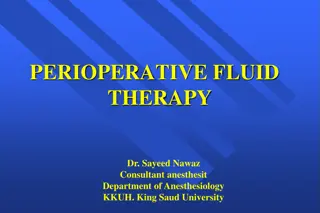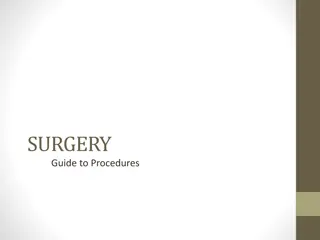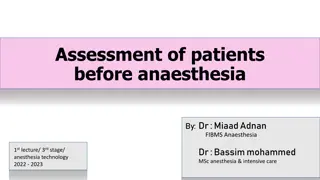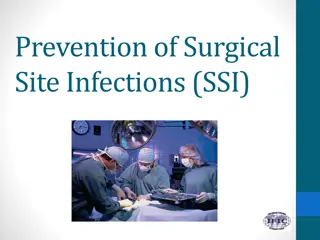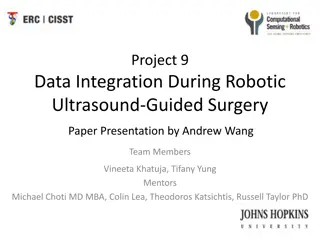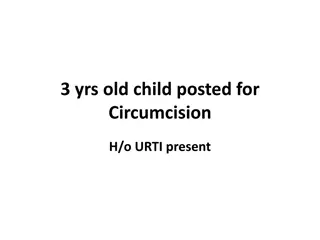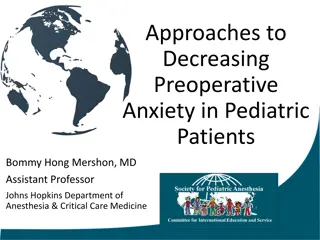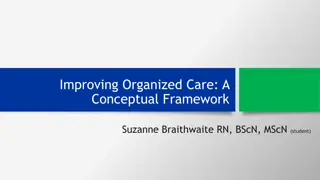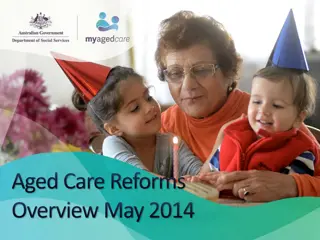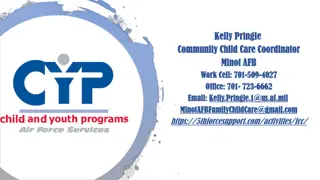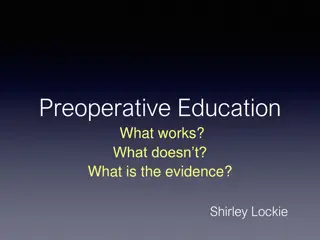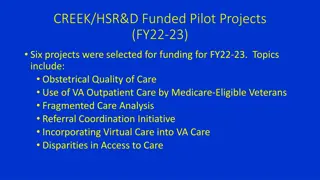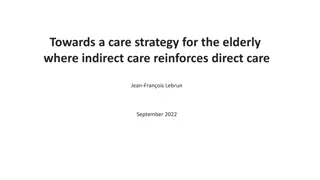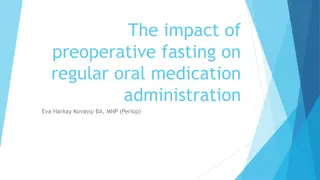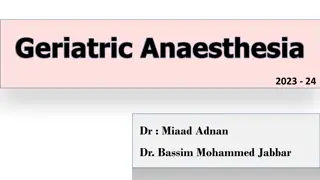Perioperative Patient Blood Management
The Patient Blood Management (PBM) Program implemented by Orthopaedic Surgeon Daryl Teague to provide optimal care for Ruby, a 73-year-old with diabetes and high blood pressure, who needs a new hip joint. The program includes preoperative anemia assessment, intraoperative blood conservation, and pos
2 views • 20 slides
Preoperative Bone Health Assessment in Spine Fusion Surgery
This presentation by Dr. Mark L. Prasarn focuses on the importance of assessing preoperative bone health in older patients undergoing spine fusion surgery. It covers the potential bone-related complications, osteogenesis process, osteoconduction, osteoinduction, and the favorable biomechanical envir
1 views • 67 slides
Anesthesia and Perioperative Care - Comprehensive Guide by Dr. Rajesh Raman
This detailed guide by Dr. Rajesh Raman covers various aspects of anesthesia and perioperative care, including preoperative assessment and optimization, intraoperative care, postoperative care, perioperative risk assessment, risk due to surgery, medication management, and routine investigations for
2 views • 31 slides
Quick MD Care_ Your Trusted Partner in Primary Care Medicine
Quick MD Care: Your Trusted Partner in Primary Care Medicine\n\nWelcome to Quick MD Care, where compassionate primary care meets convenience. We understand the importance of having a trusted partner in managing your health. Our team of dedicated primary care doctors is committed to providing persona
5 views • 2 slides
Anesthesia And Perioperative Care
This detailed guide covers key aspects of anesthesia and perioperative care, emphasizing preoperative assessment, optimization, intraoperative management, and postoperative care. Topics include perioperative risk assessment, risk scoring, routine investigations, and medication management strategies
1 views • 31 slides
Primary Care Services: Comprehensive Health Management for Everyone
Primary Care Services: Comprehensive Health Management for Everyone\n\nPrimary care services are the foundation of a robust healthcare system, ensuring that individuals have access to comprehensive, continuous, and coordinated care. These services are typically provided by primary care medical cente
2 views • 2 slides
Anesthesia and Perioperative Care by Dr. Rajesh Raman
This informative content covers various aspects of anesthesia and perioperative care including preoperative assessment, optimization, intraoperative and postoperative care, perioperative risk assessment, risk due to surgery, risk scores for major cardiac events, routine investigations for patients,
0 views • 31 slides
Anesthetic Management of Bronchoscopy for Airway Foreign Body
This article discusses the anesthetic management of bronchoscopy for airway foreign body, including presentation, preoperative work-up, intraoperative management, and postoperative care. It highlights the incidence of foreign body inhalation, immediate and delayed presentations, findings on chest X-
2 views • 32 slides
Understanding Palliative Care: Enhancing Quality of Life in Serious Illness
Palliative care is a holistic approach focused on improving the quality of life for patients and their families dealing with life-threatening illnesses. It involves early identification, assessment, and treatment of pain and other physical, emotional, and spiritual issues. This comprehensive trainin
0 views • 60 slides
Preoperative Fasting in Infants and Children: Guidelines and History
Explore the evolution and rationale behind preoperative fasting guidelines in infants and children, including historical cases of aspiration during anesthesia. Learn about Mendelson Syndrome, recommendations for aspiration prevention, and the development of NPO orders over the years. Discover the im
0 views • 26 slides
Child Care and Youth Programs at Minot AFB
Offering a range of child care services including Child Development Center for ages 6 weeks to 5 years, School Age Care for Kindergarten to 12 years, Family Child Care Program, and Youth Programs for ages 9-18. Services include full-time care, before/after school care, extended duty care, emergency
1 views • 6 slides
Enhancing Palliative Care in Australian Residential Aged Care
PACOP, funded by the Australian Government Department of Health and Aged Care, is a program focused on improving palliative care in residential aged care facilities. It involves standardized assessment practices, early identification of care needs, and a collaborative model for sustainable support.
0 views • 10 slides
Essential Aspects of Perioperative Nursing Care
Perioperative nursing involves comprehensive care for patients before, during, and after surgery. It encompasses various phases such as preoperative, intraoperative, and postoperative care, with a focus on ensuring the patient's well-being and safety throughout the surgical process. Key goals includ
0 views • 33 slides
Preoperative Planning for Surgery: Optimizing Patient Outcomes
Major surgery can induce physiological changes, increasing oxygen demand and leading to postoperative risks. Careful preoperative planning is crucial to minimize adverse effects. This involves thorough history-taking, examination, and investigations to assess patient readiness and optimize their con
0 views • 35 slides
Priorities and Quality Measures for Type 2 Diabetes Care in NHS GGC
Dr. Kashif Ali leads primary care for Type 2 diabetes, while Dr. James Boyle oversees secondary care in NHS GGC. The data from December 2018 shows the number of Type 2 diabetes patients, their care processes, HbA1c levels, and BMI status. The Diabetes Quality Improvement and Outcome Measures aim to
0 views • 27 slides
Autologous Blood Donation: Advantages, Types, and Considerations
Autologous blood donation involves collecting and storing a patient's own blood for later transfusion, offering numerous advantages such as reducing the risk of transfusion-transmitted diseases and providing compatible blood for patients with allo-antibodies. However, it also comes with concerns lik
1 views • 46 slides
Parathyroid Carcinoma Misdiagnosed as Thyroid Lesion: A Case Study
Parathyroid carcinoma (PC) is a rare malignancy often challenging to differentiate from benign thyroid nodules. This case study highlights a 50-year-old male patient whose nonfunctioning sporadic PC was initially misidentified as a follicular thyroid nodule. Despite preoperative evaluations, includi
4 views • 27 slides
Anesthesia Management for Post-Tonsillectomy Hemorrhage in Children
This article discusses the epidemiology, causes, and anesthesia management of post-tonsillectomy and adenoidectomy hemorrhage in children. It covers the rates of hemorrhage following these procedures, including primary and secondary occurrences, mortality statistics, and specific factors contributin
0 views • 31 slides
Child Care Challenges in Kentucky: The Child Care Cliff
Explore the landscape of child care in Kentucky, revealing the challenges families face with the Child Care Cliff. Discover statistics on child care centers, family child care homes, and the average cost of child care in Kentucky. Understand the importance of the Child Care Assistance Program (CCAP)
0 views • 18 slides
Anesthesiology Lecture Series: Comprehensive Overview by Dr. Jumana Baaj
Delve into the realm of anesthesiology with Dr. Jumana Baaj's comprehensive lecture series covering the role of an anesthetist in preoperative care, NCEPOD classifications, perioperative patient journey, general anesthesia techniques, and airway management. Learn about patient assessment, anesthetic
0 views • 35 slides
Perioperative Fluid Therapy: Key Concepts and Considerations
Understanding perioperative fluid therapy is crucial for maintaining normovolemia, achieving hemodynamic stability, and preventing complications. Factors such as total body water variation, fluid resuscitation goals, desirable outcomes, and fluid and electrolyte regulation play a critical role in en
3 views • 56 slides
Comprehensive Guide to Surgical Procedures Preparation
This detailed guide provides step-by-step instructions on patient preparation for surgical procedures, including patient prep, setting up sterile fields, and prepping the operative site. It covers essential aspects such as emplacing a tourniquet, washing the wound, performing preoperative irrigation
1 views • 40 slides
The Role of ESR and CRP in Preoperative Workup for Total Knee Arthroplasty
Preoperative assessment for primary total knee arthroplasty should consider including ESR and CRP levels as routine tests due to their accuracy in diagnosing periprosthetic joint infection (PJI). Elevated postoperative ESR/CRP levels can serve as predictors of PJI, aiding in prompt diagnosis and tre
1 views • 26 slides
Preoperative Assessment of Patients for Anesthesia: Guidelines and Protocols
Efficient preoperative assessment is crucial to ensure patient safety and optimal outcomes during anesthesia administration. This process involves thorough history taking, physical examination, evaluation of medical conditions, and planning for anesthesia techniques. The assessment helps in identify
0 views • 46 slides
Prevention of Surgical Site Infections: Key Factors and Recommendations
Surgical site infections (SSIs) are a significant concern in healthcare settings, with 25% of healthcare-associated infections being SSIs. They are preventable, but still pose challenges due to multifactorial causes. Risk factors include uncontrolled diabetes, obesity, smoking, and length of preoper
2 views • 28 slides
Robotic Ultrasound Integration for Surgeon Autonomy in Surgery
This paper presentation by Andrew Wang's team focuses on the data integration during robotic ultrasound-guided surgery. The project proposes the integration of live ultrasound feed and an image browser to view saved ultrasound images, along with the ability to construct 3D models of organs using pre
0 views • 22 slides
Understanding Pediatric Social and Emotional Milestones in Anesthesia
Tailoring preoperative assessment and anesthetic management to a child's developmental level is crucial. Children's responses to stress vary based on their cognitive potential and developmental stage. Incorporating behavioral techniques informed by developmental theories like Piaget's and Erickson's
0 views • 24 slides
Preoperative Considerations for Circumcision in a 3-Year-Old Child with URTI
Preoperative assessment and management play a crucial role in optimizing outcomes for young children undergoing elective circumcision, especially when the child has a history of upper respiratory tract infection (URTI). Factors such as URTI severity, parental smoking, airway anomalies, and history o
0 views • 17 slides
Pediatric Strategies to Reduce Preoperative Anxiety Impact
Pediatric preoperative anxiety can lead to negative behavioral changes post-hospitalization and adverse outcomes during anesthesia. Identifying risk factors and implementing non-pharmacologic and pharmacologic interventions can help alleviate anxiety and improve overall surgical experience for child
0 views • 36 slides
Understanding Organized Care in Primary Care Settings
Organized Care refers to a natural community of caregivers with a shared commitment to proactive population and individual care management. Through effective and efficient practices, it serves the needs of patients across various settings and over time, with aligned goals and provider accountability
0 views • 18 slides
Overview of Aged Care Reforms in May 2014
Aged Care Reforms in May 2014 introduced significant changes to the aged care sector in Australia. The reforms aimed at providing quality care for older Australians, reducing red tape, and enhancing services such as Home Care Packages, MyAgedCare, and the Australian Aged Care Quality Agency. Changes
0 views • 45 slides
Minot Air Force Base Family Child Care Programs
Offering a variety of child care services including Child Development Center (CDC) for infants to 5 years old, School Age Care (SAC) for Kindergarten to 12 years, Youth Programs for ages 9-18, and Family Child Care Program (FCC) for infants to 12 years. Additional programs include Extended Duty Care
0 views • 6 slides
Evidence-Based Insights on Preoperative Patient Education in Surgical Nursing
Preoperative patient education plays a crucial role in surgical nursing, aiming to reduce anxiety, empower patients, and enhance recovery outcomes. Limited systematic evidence exists on its specific impact, influenced by patient engagement, knowledge levels, nurse expertise, and empowerment factors.
0 views • 37 slides
Impacts of Marketisation on Home Care for Older People in Urban China
This study by Wenjing Zhang from the University of Bristol delves into the effects of the marketisation process on home care for the elderly in urban China. It explores the rationale behind the marketisation of care, the trends in home care marketisation, and the processes involved. The background s
0 views • 19 slides
Preoperative Assessment and Management for Squint Surgery in a 4-Year-Old Male Patient
Assessing a 4-year-old male patient booked for right eye squint surgery involves evaluating his preoperative risks, conducting necessary tests, assessing medication needs, and ensuring fasting protocols are followed. Key aspects include reviewing medical history, conducting physical examinations, ad
0 views • 14 slides
VA Healthcare Pilot Projects FY22-23
Six VA-funded pilot projects for FY22-23 focus on improving obstetrical quality of care, outpatient care utilization by Medicare-eligible veterans, fragmented care analysis, referral coordination, virtual care integration, and addressing disparities in access to care. Projects include assessing obst
0 views • 7 slides
Enhancing Elderly Care: Direct and Indirect Support Strategies
Implementing a care strategy for the elderly involves integrating both direct, personal care activities and indirect care tasks. This approach benefits two key target audiences, including millions with varying levels of dependency and informal carers. The positive impacts of indirect care include we
0 views • 7 slides
Understanding Subacute Care: Types of Residents and Care Settings
Subacute care involves providing specialized care for individuals who require more attention than what typical long-term care facilities can offer. This level of care is provided in settings like hospitals or certain units within long-term care facilities. Residents in subacute care settings need a
0 views • 62 slides
Impact of Preoperative Fasting on Oral Medication Administration
Investigating the impact of preoperative fasting on the continuity of regular oral medication administration reveals concerns with excessive fasting, including insulin resistance, dehydration, and confusion. The study highlights how misleading fasting instructions can lead to the discontinuation of
0 views • 29 slides
Geriatric Anaesthesia: A Guide to Perioperative Care for Elderly Patients
The field of geriatric anaesthesia addresses the unique challenges faced by elderly patients undergoing surgery, including higher perioperative complication rates due to reduced functional reserve and co-morbidities. This guide emphasizes the importance of careful preoperative assessment, meticulous
0 views • 25 slides
